| 1 | Adopted in Iran |
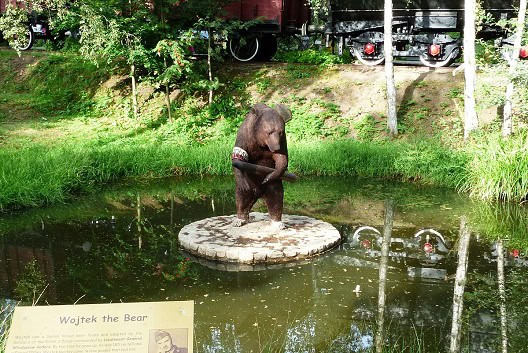
The origin story of Wojtek the fighting WW2 bear goes that a band of Polish soldiers were marching across the Iranian desert in April 1942, having just been released from the Siberian gulags. On April 8th, they came across a thin, scraggly yet energetic brown bear cub running around at a railway crossing. The cub was a member of the elusive Syrian brown bear subspecies, and with it was an orphan boy whose mother had been shot dead.
Remembering their own punishing nights in the gulag, the soldiers bought the cub from the starving orphan using a payment of chocolate, Persian coins, a Swiss army knife, and a tin of beef. Then they granted him the immortal name – Wojtek. An 18 year old girl called Irena was particularly taken with the cub, and spent months feeding him condensed milk inside a vodka bottle.
After staggering out of the desert, the soldiers reenlisted, and tried at first to hide Wojtek from their commanding officers by keeping him in a tent. But the bear kept on growing, and to the soldiers’ surprise, their superiors granted them permission to keep Wojtek as a mascot. A man called Peter Prendy was appointed as Wojtek’s guarding officer. In truth, they probably realised that the loyal bear would return to camp no matter what they did.
| 2 | A fully functional soldier |
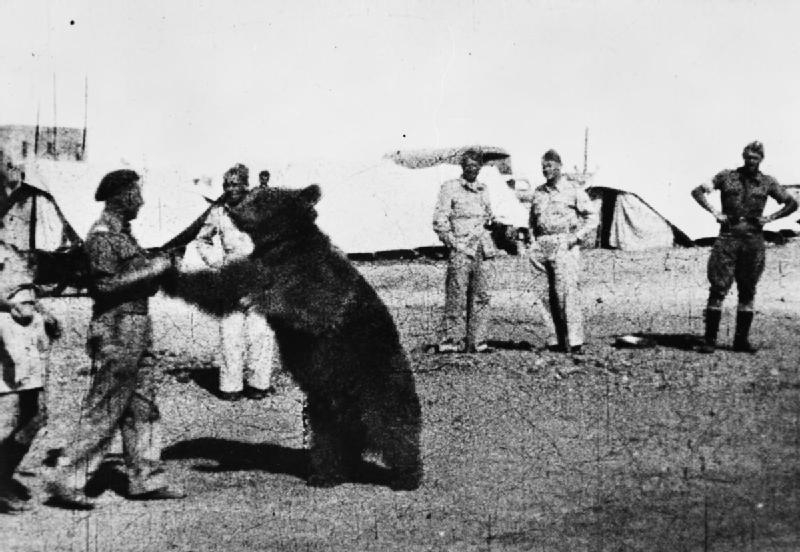
In 1943, the allies were preparing their grand invasion of Italy, and Polish troops were being shipped over to Egypt for preparation. However, the British had strict rules about bringing pets into warzones. A 450 pound bear would be denied entry onto the ship, no matter how cute and cuddly. There was only one solution: enlisting Wojtek into the 22nd Artillery Transport Company of the 2nd corps, and granting him a number code and the rank of private.
Quickly, Wojtek proved to be an above average soldier. He learned to march in formation by watching his fellows, and even slept in the same bed as his fellow Polish soldiers. He rapidly learnt to salute when greeted, and while zoologists might argue that this was mimicry similarly to a parrot, it’s equally possible that Wojtek understood the military significance of this. He was perfectly able to understand basic commands like sit and stand when stated in Polish. At one point, Wojtek sniffed out an enemy spy that had been hiding in the bathhouse. He simply walked in, growled, and slapped the man’s head, causing the terrified spy to believe that the Polish had unleased a monster on him. The spy was quickly surrounded and hauled off to jail.
Wojtek’s accomplishments were many, and by the war’s conclusion, he had risen to the rank of corporal.
| 3 | Wojtek’s diet (featuring beer) |
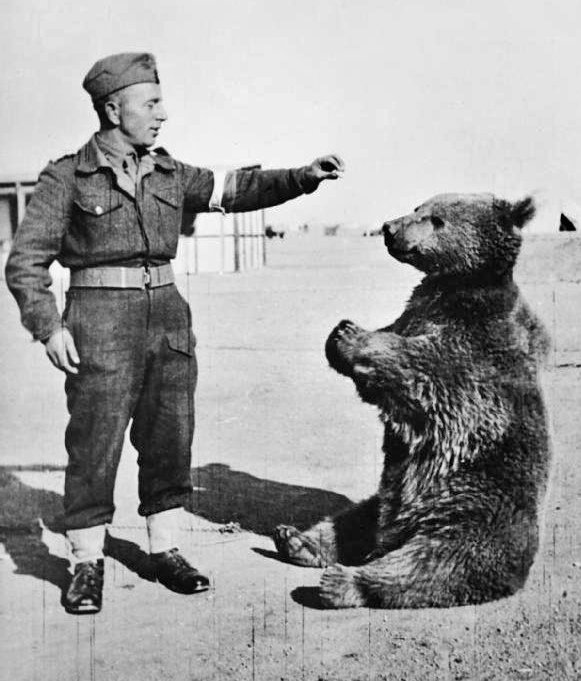
Just as he learned to salute and march, Wojtek adopted the diet of the soldiers who rescued him. Cigarettes were a particular favourite, for which Wojtek had a different method to usual: he would accept the lit cigarette from a soldier, take a single puff, and swallow the rest whole. During his later years in Edinburgh zoo, visitors would throw cigarettes into his enclosure and he would gobble them down like the good old days.
Wojtek also developed a taste for beer, which he swilled directly from the bottle. When every last drop was gone, the bear would peer into the bottle to find out where the beer had disappeared to. At 450 pounds, he never once got drunk. Coffee was another favourite, gulped down in the morning. We’ll never know whether Wojtek loved the taste or needed a pep up boost for all the wrestling he did.
As a fully grown bear, his favourite foods were said to be 1) marmalade (proving that Paddington is in fact a documentary), 2) fruits, 3) honey (big surprise) and 4) syrup. His appetite was huge, but this had unfortunate side effects. One Christmas night, Wojtek had a grand feast with his soldier friends, but afterwards, he sniffed out a path to the pantry where the jam and confectionaries were stored. The result was complete and utter devastation.
| 4 | Battle of Monte Cassino |
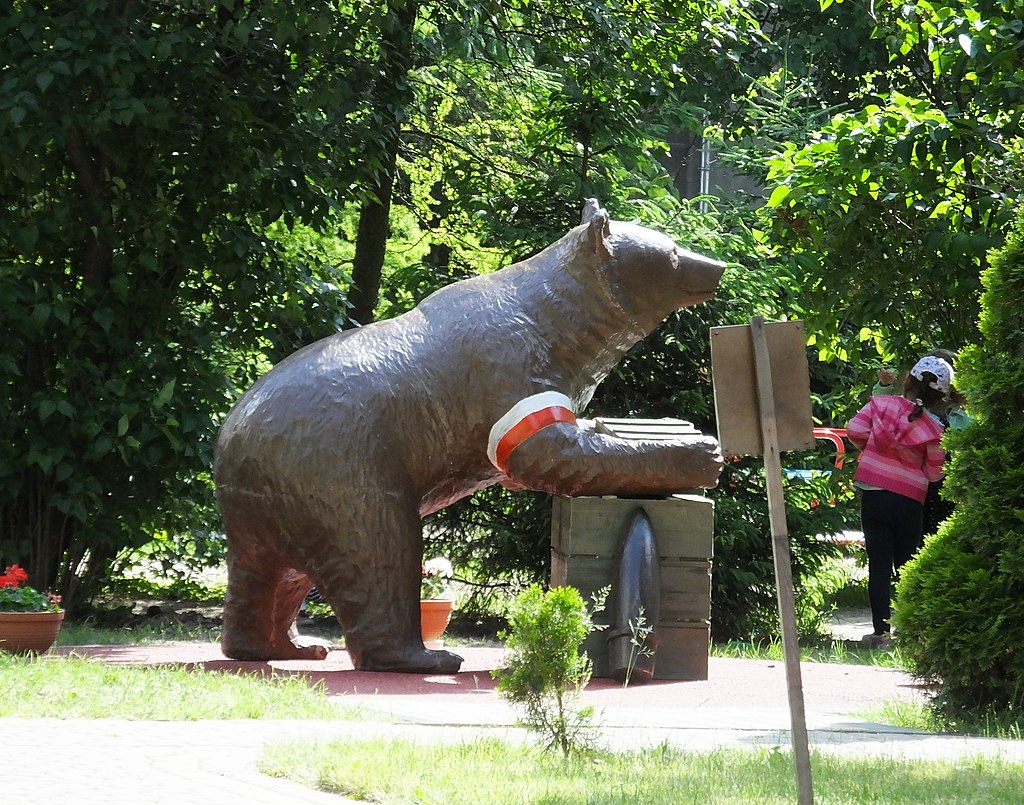
Wojtek played an important role in the 1944 Battle of Mont Cassino, an attempt by the allies to break through the Italian front line and advance on Rome. The 22nd regiment was charged with supplying battalions on the front line, driving around hairpin bends in the dark for maximum speed before returning with the next batch.
When the first shells began to fall, Wojtek scampered up a tree in fear. Before long though, he had carved out a niche for himself: carrying 100 pound crates of artillery shells back and forth, which were too heavy for normal, non-bear soldiers to carry. Legend states that Wojtek never once dropped a load he was carrying. A controversy erupted, with reporters back home calling it wartime propaganda, but a 2011 documentary featured old British soldiers insisting that they’d spotted a bear hauling ammunition.
More recently, the grandchildren of Monte Cassino veterans recalled their grandfathers telling the story – but had just assumed for decades that they were being mischievous and pulling their leg. Only recently with the internet have they discovered that the story was true all along.
After this 110% true story, the regiment changed its insignia to an upright bear walking forward with a missile in both hands.
| 5 | Wojtek’s wrestling contests |
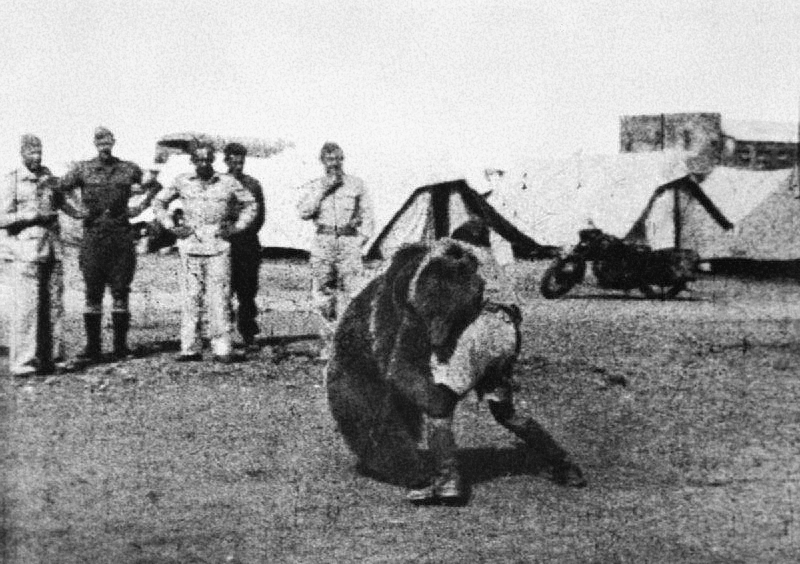
Wojtek was famously obsessed with wrestling, and would initiate anyone he met into his favourite sport. Amazingly, he understood that he couldn’t be too rough with his weaker human associates, and rarely caused injuries. The only real danger was a torn uniform, although that said, most of the soldiers still had to summon up enough courage for a round with the beast, no matter how lovable he was.
When former soldiers visited Wojtek in Edinburgh zoo post 1947, they always insisted to horrified zookeepers that they be allowed close enough to revive their old wrestling bouts. A vast proportion of the photos taken of Wojtek show him wrestling fellow soldiers.
Other sports mentioned in soldiers’ recollections include arm wrestling and the tug of war. Could Wojtek had made it to the ranks of the WWE had he lived today? It’s possible. He was also fond of soccer and swimming. When the regiment arrived at the Mediterranean sea, Wojtek would always run into the water and splash around for a while. Another popular “sport” was scaring the ladies bathing on those beaches.
| 6 | Wojtek’s animal buddies/rivals |
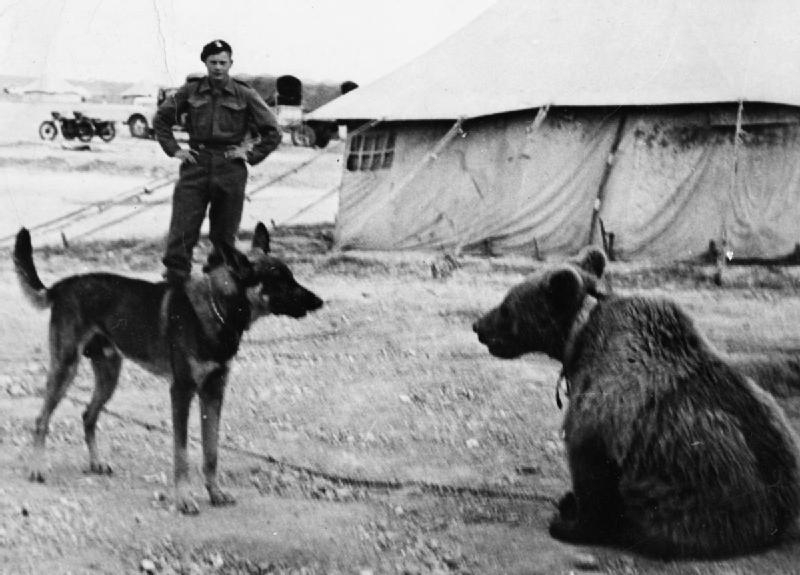
During his wartime golden age, Wojtek became great friends with a local Dalmatian called Kirkuk, who he would also wrestle. However, he took a disliking to a company horse, quite understandably seeing as this horse decided to kick him in the head.
The Polish also adopted a monkey called Kasha; some legends state that Wojtek got on with the monkey famously, but it’s more commonly reported that they disliked each other. Supposedly, Kasha (or Kasia) constantly tried to climb onto Wojtek’s back, which spooked the bear and made him run away. Interestingly, Wojtek didn’t get on with a second, less famous bear that the Polish adopted.
Wojtek proved to be the most resilient mascot. Kasha died just 1 year after her child failed to survive, possibly from a broken heart. Kirkus died after a scorpion crawled out of the Arabian desert and stung her. Later, Wojtek himself was stung on the nose. He rapidly fell ill, and his close companion Henry sat at his bedside for days to nurse him back to health. Miraculously, Wojtek pulled through and returned to his normal duties 2 days later.
| 7 | A mischievous bear |
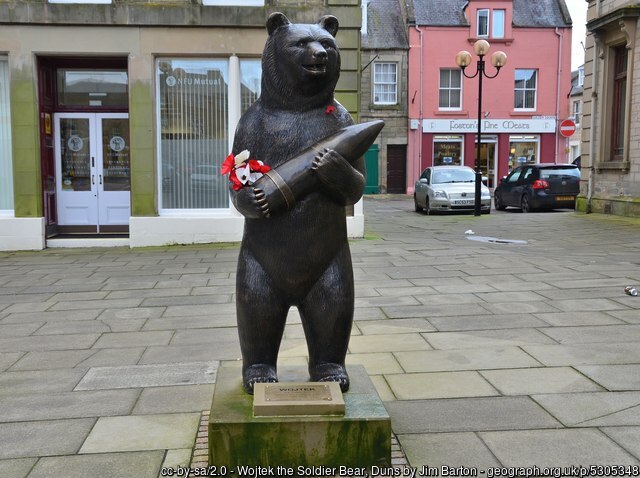
During his stay in Palestine, Wojtek became so thirsty that he used to chase after the oranges hurled into the distance by soldiers for grenade practise. Wojtek was intelligent enough to operate the showers and clean himself properly, but the water supply was rationed, and one time Wojtek broke into the bathing tent and depleted half of it. He often rode shotgun in army vehicles zipping down the roads, causing all but the most hardened passers-by to double take in shock.
Another time, Wojtek decided to steal an entire batch of women’s clothing belonging to local female personnel, shortly after the Polish regiment transferred to a British base in Iraq. The Polish soldiers later taught Wojtek to pick up new recruits and dangle them upside down by their boots, to toughen them up for future battles.
Sometimes though, he used his skills for good. When the unit was stationed in Palestine, Wojtek once sensed that trouble was brewing. He entered the munitions store, and discovered that a petty thief was trying to make off with a crate of ammunition. A commotion ensued as the thief was caught due to his incredibly loud screams of surprise. This was simply another day in the life of Wojtek the WW2 bear. His reward was a bottle of beer.
| 8 | Scottish retirement |
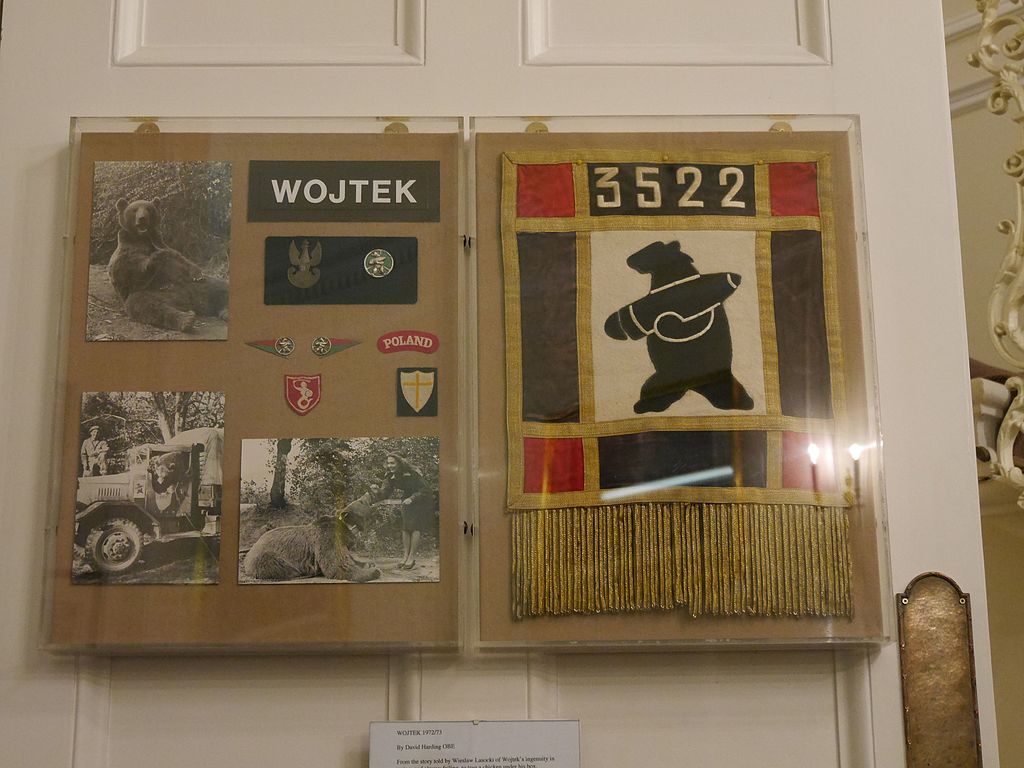
After V-day, Poland ended up in the shadow of the Soviet Union. The Polish regiment knew that if they returned home, they would probably end up in the gulag again, back where they started. Instead, they were brought back to the Scottish village of Hutton, and until the 22nd regiment was finally disbanded on November 22nd 1947, Wojtek lived there with them. There was great debate, but the 22nd regiment feared that the Soviet government would use Wojtek as a propaganda symbol for the communist ideology they hated so much.
So instead, Wojtek spent two years roaming the streets of Scotland, where he interacted with adults and kids and became a local sensation. His claw marks can still be seen on the trees of the Hutton farm where the Polish soldiers stayed. Wojtek swam in the nearby river Tweed for sport, and relished in letting the local children ride on his back. He enjoyed being groomed, and was probably the cleanest bear in the world.
According to Ailene Orr, whose family owned the farm in Hutton, Wojtek attended dances, balls and local children’s parties. Wojtek “was always well-behaved in social gatherings” and “he knew when he had done wrong“.
| 9 | Final years |
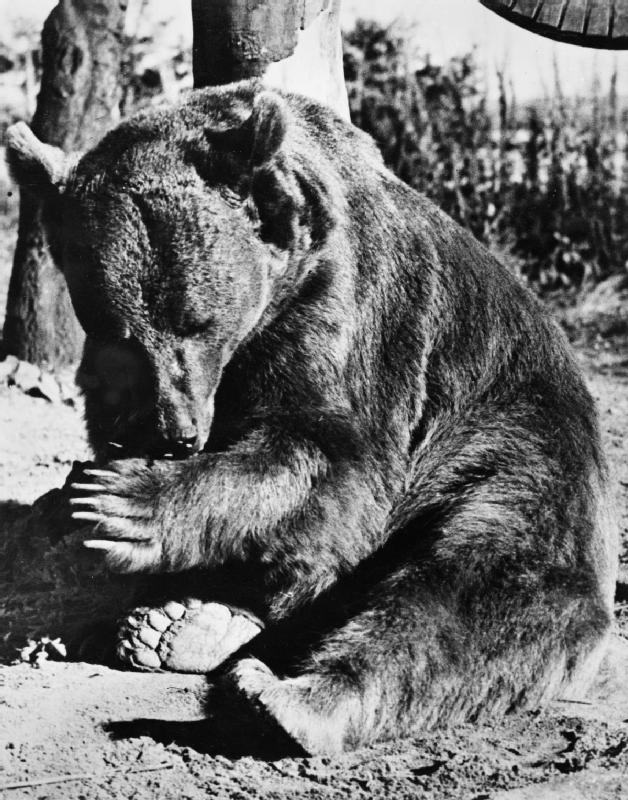
Following the disbandment of the 22nd regiment in November 1947, Wojtek moved to Edinburgh Zoo, where he resided for the rest of his life. His former comrades wanted the best for him, but faced an uncertain future themselves, either settling in Britain, or being shipped off to Canada and Australia, all to avoid communist tyranny.
The Wojtek story came to an end in 1963 when the bear was euthanised at the age of 22. He had been sick for years, a depressed, cigarette addicted bear kept in a cage far too small for an animal that naturally roams the wilderness for miles. His oesophagus was burnt due to his habit of swallowing cigarettes, his appetite and weight had plummeted, and he had developed a stiff gait.
However, it wasn’t a story of complete grimness. Wojtek made several appearances on the children’s TV programme Blue Peter, calculating that the war days were over and it was clearly time to transition to children’s entertainment. It’s said that to his dying day, hearing the Polish language would cause Wojtek to stand on his hind legs and salute inside his enclosure at the zoo. While some soldiers returned to Poland and remember Wojtek only in memories, many other veterans visited him. Some sneaked into his enclosure when zookeepers weren’t looking and wrestled with the old bear like 10 years had never passed. It’s said that upon leaving, it felt for a moment like their youth was back. Did Wojtek feel the same way? Almost certainly.
| 10 | Statues are everywhere |
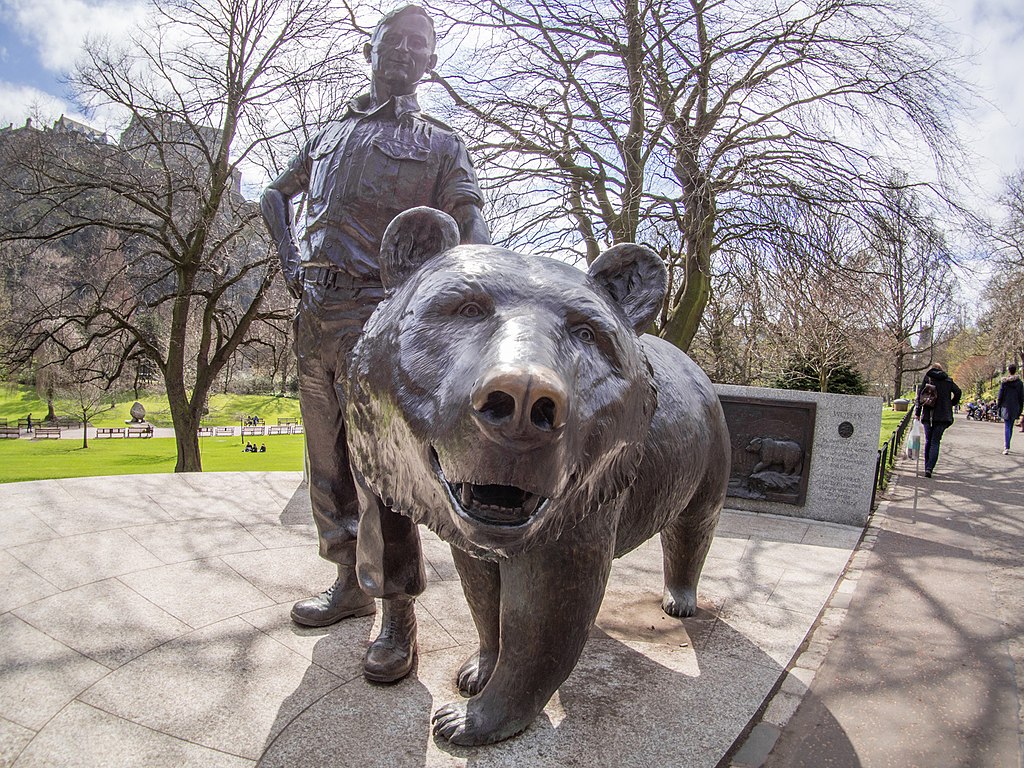
On November 7th 2015, the ghost of Wojtek had officially arrived in Edinburgh, as a bronze statue was unveiled in Princes Street Gardens. It showed Wojtek on all fours, accompanied by one of his beloved Polish soldier companions. The monument cost £300,000 to make, and fittingly stood on Polish-made granite.
Now though, statues are springing up all over the world. Another is found in Park Jordana in Krakow, Poland, standing 2 metres tall. Fittingly, the statue was unveiled in 2014, the 70th anniversary of the Battle of Monte Cassino, Wojtek’s finest hour.
Krakow is filled with statues of other, less bear-like war veterans and it’s inevitable that some will have done a double take when they reach the next in line and find a 400 pound brown bear. Duns, Scotland has a statue of Wojtek holding an artillery shell, the image that defined him on insignias everywhere. Being Duns’ twin town, Zagan in Poland has a nearly identical statue.
Nobody knows where Wojtek will spring up next, but one thing is inevitable – he’s on his way.

Leave a Reply